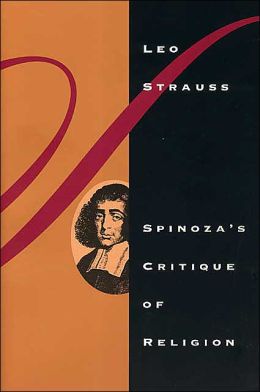Spinoza's Critique of Religion, trans. E. M. Sinclair, University of Chicago Press, 1997. Originally published as Die Religionskritik Spinozas als Grundlage seiner Bibelwissenschaft Untersuchungen zu Spinozas Theologisch-Politischem Traktat, Akademie-Verlag, 1930.
Excerpt from the preface to the English translation:
Considerations like those sketched in the preceding paragraphs made one wonder whether an unqualified return to Jewish orthodoxy was not both possible and necessary — was not at the same time the solution to the problem of the Jew lost in the non-Jewish modern world and the only course compatible with sheer consistency or intellectual probity. Vague difficulties remained like small faraway clouds on a beautiful summer sky. They soon took the shape of Spinoza — the greatest man of Jewish origin who had openly denied the truth of Judaism and had ceased to belong to the Jewish people without becoming a Christian. It was not the “God- intoxicated” philosopher but the hard-headed, not to say hard-hearted, pupil of Machiavelli and philologic-historical critic of the Bible. Ortho- doxy could be returned to only if Spinoza was wrong in every respect.
That Spinoza was wrong in the decisive respect had been asserted about a decade earlier by the most authoritative German Jew who symbolized more than anyone else the union of Jewish faith and German culture: Hermann Cohen, the founder of the Neo-Kantian school of Marburg. Cohen was a Jew of rare dedication, the faithful guide, defender and warner of German Jewry, and at the same time, to say the least, the one who by far surpassed in spiritual power all the other German professors of philos- ophy of his generation. It became necessary to examine Cohen’s attack on Spinoza. That attack had been occasioned by a particularly striking act of celebration of Spinoza on the part of German Jews.
There were two reasons why contemporary Jews were inclined to cele- brate Spinoza. The first is Spinoza’s assumed merit about mankind and only secondarily about the Jews; the second is his assumed merit about the Jewish people and only secondarily about mankind. Both reasons had induced contemporary Jews not only informally to rescind the excom- munication which the Jewish community in Amsterdam had pronounced against Spinoza, but even, as Cohen put it, to canonize him.
The great revolt against traditional thought or the emergence of modern philosophy or natural science was completed prior to Spinoza. One may go further and say that, far from being a revolutionary thinker, Spinoza is only the heir of the modern revolt and the medieval tradition as well. At first glance he might well appear to be much more medieval than Descartes, to say nothing of Bacon and Hobbes. The modern project as understood by Bacon, Descartes and Hobbes demands that man should become the master and owner of nature ; or that philosophy or science should cease to be essentially theoretical. Spinoza, however, attempts to restore the traditional conception of contemplation : one cannot think of conquer- ing nature if nature is the same as God. Yet Spinoza restored the dignity of speculation on the basis of modern philosophy or science, of a new understanding of “nature.” He thus was the first great thinker who attempted a synthesis of pre-modern (classical-medieval) and of modern philosophy.
Online:
Google Books
Amazon

